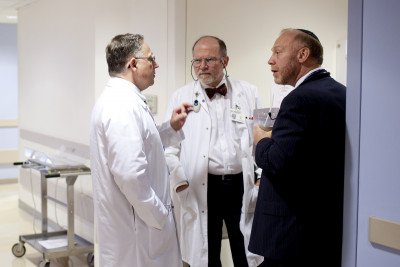
Team approach: (From left) Pediatric surgeon Michael La Quaglia talks with sarcoma experts Paul Meyers and Leonard Wexler.
An accurate diagnosis is essential to ensure that your child gets the most-effective therapy. Some people come to MSK thinking they have one type of cancer, but they learn through our precision testing that they have a different type of cancer. At MSK Kids, your child benefits from a team of pathologists (doctors who specialize in diagnosing disease) who are dedicated to the sarcoma program and are experts at identifying the features and subtle nuances of each patient’s disease.
How is Ewing sarcoma diagnosed?
Your child’s pathology team will analyze a sample of the tumor. This is called a tissue biopsy. Our surgeons obtain the sample while your child is sedated with anesthesia. We look for genetic changes in the sample that are found only in Ewing sarcoma.
What tests will my child need?
If we believe your child may have Ewing sarcoma, we will test for genetic changes that are unique to this disease. MSK doctors were the first to identify unique gene changes in tumors that look like Ewing sarcoma. If your child’s tumor looks like Ewing sarcoma but doesn’t seem to have one of the genetic changes usually found in this disease, we will perform more precise tests to make the correct diagnosis.
How is Ewing sarcoma staged?
Ewing sarcoma can spread widely throughout the body. In addition to a tissue biopsy, your child will typically have imaging tests to determine if the cancer has spread. This process is called staging. Staging is important because it enables doctors to determine the best care plan for your child. Imaging tests may include X-rays, CT scanning, MRI, PET scanning, and bone scans. Doctors may also do an examination of the bone marrow. We will let you know which tests your child will have and what to expect for each. Our team does all we can to ensure that your child is comfortable during these tests.
If your child’s cancer hasn’t spread, it is called localized Ewing sarcoma. If the cancer has spread, it is called metastatic Ewing sarcoma. Metastatic Ewing sarcoma most often spreads to the lungs. Your child’s doctor will explain what this means for your child’s care.


